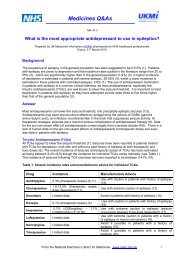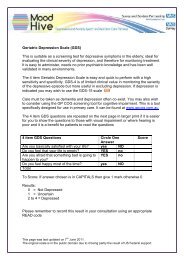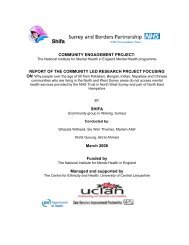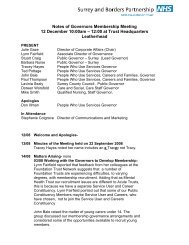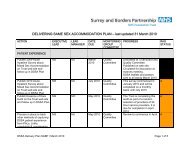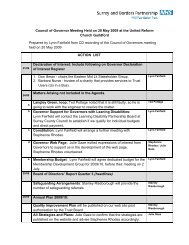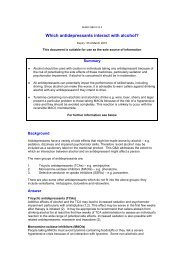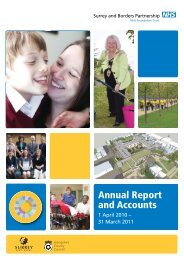Here - Surrey and Borders Partnership NHS Foundation Trust
Here - Surrey and Borders Partnership NHS Foundation Trust
Here - Surrey and Borders Partnership NHS Foundation Trust
You also want an ePaper? Increase the reach of your titles
YUMPU automatically turns print PDFs into web optimized ePapers that Google loves.
In our sample the GPs screening method<br />
was very effective at ruling out BPD, but<br />
was less accurate when it came to ruling<br />
the condition in.<br />
The MHNPs’ method was also ineffective<br />
at ruling in BPD <strong>and</strong> although it was<br />
slightly better at ruling out this condition,<br />
only the NPV was above the cut off value.<br />
However for both groups of practitioners<br />
the LR+ <strong>and</strong> LR- of their methods, which<br />
reflects the value of a positive or negative<br />
test result, was well below the accepted<br />
cut off range. This suggests that the<br />
methods used by the primary care<br />
practitioners in our study had little value<br />
in correctly identifying the presence or<br />
absence of BPD.<br />
There are, however, some limitations to<br />
our study. We should note that this study<br />
encompassed relatively small numbers<br />
<strong>and</strong> this makes it difficult to make<br />
predictions about how these methods<br />
would perform in a larger population. In<br />
this study neither the GPs nor the MHNPs<br />
used a st<strong>and</strong>ardized screening tool;<br />
instead we were examining the validity of<br />
the methods they are already using.<br />
Although our results suggest that the GPs<br />
methods were slightly more effective<br />
than the MHNPs’ methods, it is also<br />
possible that the cases seen by the<br />
MHNPs were more complex <strong>and</strong><br />
displayed a less clear cut presentation.<br />
Another limitation of the study is that the<br />
psychiatrist’s diagnosis may not represent<br />
an accurate gold st<strong>and</strong>ard, particularly in<br />
patients suffering a first episode of<br />
affective illness.<br />
In summary, the results of our study show<br />
that within the primary care setting in our<br />
catchment area screening for BPD is<br />
currently unacceptably low. Also it clearly<br />
shows that screening for BPD greatly<br />
enhances the chances of recognising this<br />
condition <strong>and</strong> that current screening<br />
methods used by primary care<br />
practitioners could be improved.<br />
Recommendations<br />
1. Increase awareness of BPD <strong>and</strong> the<br />
importance of screening within our<br />
primary care setting. This could be<br />
achieved by doing a presentation for<br />
GPs <strong>and</strong> MHNPs regarding the findings<br />
of our study.<br />
2. Role out the use of the MDQ as a<br />
st<strong>and</strong>ard screening tool to be<br />
administered to all patients in primary<br />
care presenting with an affective<br />
episode.<br />
3. Improve communication between<br />
primary <strong>and</strong> secondary care<br />
practitioners. This could be through<br />
informal discussions or telephone<br />
advice.<br />
4. Re-audit in 12 months to see the<br />
change in practice.<br />
References<br />
• Angst J. The emerging epidemiology<br />
of hypomania <strong>and</strong> bipolar II disorder.<br />
Journal of Affective Disorders, 1998; 50:<br />
143-51.<br />
• Bauer MS, McBride L, Williford WO et<br />
al. Collaborative Care for Bipolar<br />
Disorder: Part II. Impact on Clinical<br />
Outcome, Function, <strong>and</strong> Costs.<br />
Psychiatric Services, July 2006; 57:937-<br />
945.<br />
• Brickman, Andrew L, LoPiccolo et al.<br />
Screening for bipolar disorder. Psychiatric<br />
Services, March 2002; 53/3(349): 1075-<br />
2730.<br />
• Corona, Rodrigo, Berlanga et al.<br />
Detection of bipolar disorder with a<br />
clinical screening questionnaire: The<br />
Spanish version of the Mood Disorder<br />
Questionnaire. Salud Mental, March<br />
2007; 30(2): 50-57.<br />
• Das Gupta R, Guest JF. Annual cost of<br />
bipolar disorder to UK society. British<br />
Journal of Psychiatry, 2002; 180: 227-33.<br />
Research <strong>and</strong> Audit<br />
<strong>Surrey</strong> <strong>and</strong> <strong>Borders</strong> Online Journal www.sabp.nhs.uk/journal 15



